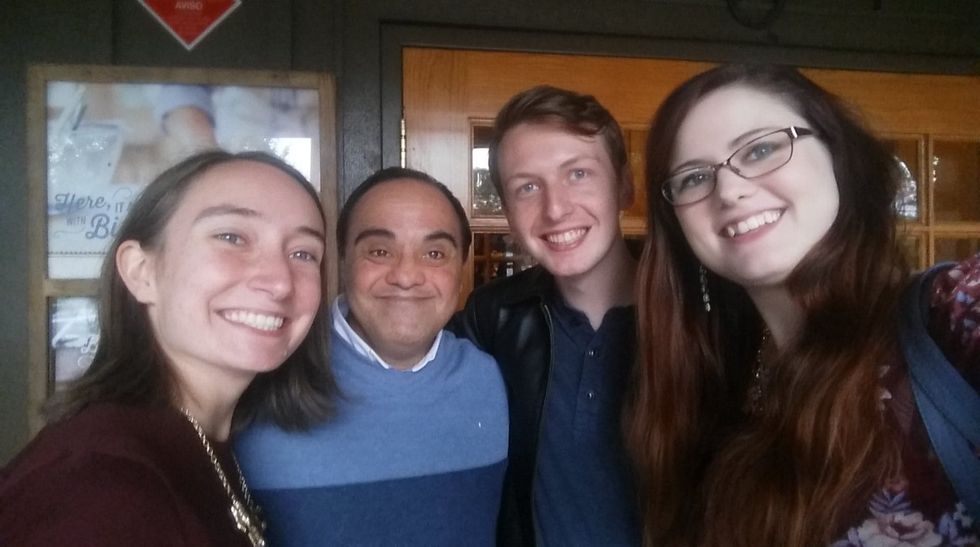If you didn't know, October is Down Syndrome Awareness Month. Down Syndrome is when a person is born with extra chromosomes that can cause someone to develop differently than others. It's random, although women over the age of 35 have a higher possibility of their child having Downs.
I use the word "possibility" intentionally. Most of the time, I hear people say the word "risk." Risk implies danger and though a child with Downs and their family may face danger, like health problems and bullying, there is no danger in a new baby, even if that baby is different. My friend's mother even prayed that she would have more children and grandchildren with Down Syndrome because my friend, her son, was different and that made him a blessing.
That's why it's important to celebrate Down Syndrome Awareness month every October. Being different is being applauded in some spheres where we encourage uniqueness when it is pretty and exciting. But we need to accept it all of the time, especially when people look and act different from us. And acceptance comes through awareness.
Firstly, be aware that people with Down Syndrome are all different ages. We pay attention to kids who have special needs and we shuffle them through our school system, but then we tend to forget about them. After all, their future looks different than most "normal" people's future, right? Can they go to college? Can they work a normal job? Won't their families just take care of them?
Every person with Down Syndrome is different, just like every other person in the world. Some of them will be able to attend college. There are currently four colleges/universities with specific programs for people with intellectual disabilities. My friend with Downs chose to attend Bible college and graduated with honors. Sometimes local community colleges are great options. Of course, college might not be the best choice for other people with Downs, just like college isn't the best choice for every other high school graduate.
The job market is equally diverse. The Stadthaushotel in Hamburg is run by an array of people with different abilities. Bitty & Beau's Coffee, which has two locations in North and South Carolina, is staffed by people with different abilities as well. John Lee Cronin, a young man with Down Syndrome, is co-founder of the online company John's Crazy Socks. Geoffrey Mikol (another young man with Down Syndrome) went to college and now runs an art gallery showcasing and selling his photography. Gracie's Doggie Delights is an online business run by Grace Jagler, a young woman with Downs who owns rescue dogs and had difficulty finding a job before she became an entrepreneur. My friend with Downs worked in his father's restaurant before his father retired and most recently was a greeter at a restaurant where he lives. There are also models and actors with Downs.
Family involvement and independence for people with Downs is also a spectrum. Organizations such as "Just" People have a variety of programs that can help with independent living. Some individuals may want to live at home with their families. Whatever choice is made is for what is best for the person with Downs.
Second, be aware of how you interact with someone with Downs (or any other differently abled person). I remember being out at dinner with my sister and our friend with Downs. As we left the restaurant we passed a table full of people and I felt their questioning eyes on us for several minutes. They watched us leave, slightly quieter than they were before. When a larger group of us was at the movies, I saw adults do double-takes, as if they couldn't believe that they were seeing a person with Downs out in the community with friends, living a normal life. If my friend noticed either of those interactions, he didn't mention it. But I did, and I was hurt by these judgmental interactions. People with Downs are not rare, mysterious creatures. They're people. When speaking to a class of doctors at the University of Birmingham, my friend Ben asked them to treat their future patients with Downs just like they'd treat any other patient because they're people too.
When you treat them like people, it's wonderful. The manager at our local Cracker Barrel got a big hug from my friend as he thanked him for a good meal. The cashier at our local Smoothie King got a fist bump for his choice in country music. Students who stop to meet my friend after the Wednesday night service on my college campus are always given handshakes, sometimes even hugs.
So celebrate Down Syndrome Awareness Month by actually getting educated and having a positive interaction with someone with Downs. Remember that their lives are as unique as yours are and that how you treat them is important. We're all people who need kindness.





 mr and mrs potato head
StableDiffusion
mr and mrs potato head
StableDiffusion










